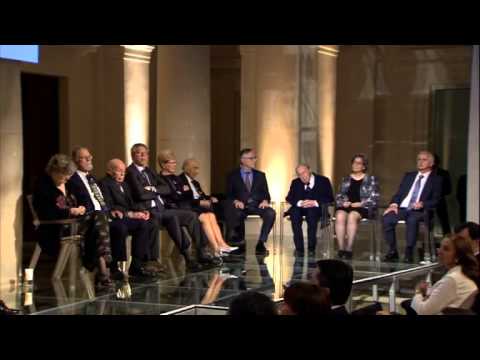NEWS
Boulez wins the BBVA Foundation Frontiers of Knowledge Award for the influence of his compositions and his engagement with musical thought and musical transmission
The BBVA Foundation Frontiers of Knowledge Award in the Contemporary Music category goes in this fifth edition to Pierre Boulez, in recognition that “he is not only an eminent composer, with a determinedly forward vision, but also a key figure engaging in every aspect of musical reflection and transmission,” in the words of the award citation. “The sum of his activities,” the jury concludes, “evidences an acute awareness of the artist’s intellectual and social responsibility in the modern age.”
12 February, 2013
Pierre Boulez (Montbrison,1925) was a leading figure in the “historical avant-garde” that flourished in Darmstadt (Germany) in the 1950s, formed also by composers of the stature of Stockhausen, Berio, Ligeti and Nono. Boulez is considered to be the nexus between his forebears, his own generation and the composers of today.
His career has been defined by three intersecting paths which the jury chose to highlight. The first is Boulez the composer, thinker and teacher, whose works and writings marked a radical change in the way of understanding music, and are now an established part of the contemporary repertoire: Penser la Musique aujourd’hui (1964), Relevés d’apprenti (1966), Par volonté et par hasard‘ (1975), Points de repère (1985) are some examples of his legacy in this respect.
“From his beginnings as an artist,” the jury affirms, “Pierre Boulez has opened up new perspectives in music. He has renewed musical writing and thought from the very foundations, applying a critical synthesis of the recent past and integrating elements of non-European music.”
The second path belongs to Boulez the conductor, who has appeared at festivals of the category of Bayreuth (1966 and 1976), Donaueschingen, Salzburg, Berlin and Edinburgh, and taken the helm of some of the world’s finest orchestras, including Cleveland (1967), Chicago (1995),the New York Philharmonic (1971-1978), and the BBC Symphony Orchestra (1971-1975), among a long list of others.
On this facet of the man, the jury remarks: “As a conductor, he has not only championed contemporary composers, but has also renewed the orchestral repertoire and rejuvenated concert programming, in order to bring the public to a new understanding of music.”
Boulez himself has this to say about balancing the two labors: “The problem with my life is that I am actually living two lives. I have the life of a composer, which is pure creativity, and I have the life of a performer, which involves reproducing something that is already there (…). The real complication is finding time for the two. If I was told you’re not going to conduct any more… it wouldn’t bother me for long; what is really important to me is to compose. If, on the other hand, I was told you are not going to write anything else, but just conduct, that would make me very unhappy, because it would kill a part of my creativity.”
But there is still a third facet: the institutional Boulez, the force behind groundbreaking initiatives in the investigation and practice of the music of our time, like the Institut de Recherche et de Coordination Acoustique/Musique (IRCAM), Ensemble InterContemporain, Cité de la Musique or the Opera Bastille.
Through the creation of the IRCAM research institute and Ensemble InterContemporain, the first ever permanent contemporary music ensemble, Boulez, says the jury, has “helped to strengthen the connections between scientific investigation, composition and musical practice.”
The new laureate is clear about the differences between scientific and artistic creation: “In science you have progress. What scientists do today is more concrete than what they did back in the 16th century. Not because they are more intelligent, but because they were born when science was at a more advanced stage. In music, there is not progress, only change. Wagner does not represent progress with respect to Mozart, they are on the same level of excellence.”
International jury
The jury in this category was chaired by Edith Canat de Chizy, composer and member of the Académie de Beaux-Arts, Institute de France (France), with Ranko Markovic, Artistic Director of the Konservatorium Wien Privatuniversität (Austria) acting as secretary. Remaining members were Philippe Albèra, Director of Contrechamps Éditions (France); composer Cristóbal Halffter, member of the Real Academia de Bellas Artes de San Fernando and 2009 Frontiers of Knowledge laureate in Contemporary Music; Winrich Hopp, Artistic Director of Musikfest Berlin (Berliner Festspiele) and the Musica Viva concert series (Germany); Johannes Kalitzke, composer and conductor with the Komische Oper Berlin (Germany); Martin Kaltenecker, Associate Professor of Musicology at Université Paris Diderot (France); and Dimitri Vassilakis, pianist and member of Ensemble Intercontemporain (France).


